Young Woman Forced To Choose Between Dog And Fiancé
In matters of the heart, life can take unexpected turns that challenge our emotions and decisions. For a 21-year-old woman, life recently presented her with an unforeseen dilemma that left her torn between her fiancé and an innocent puppy she rescued.
The story began innocuously when she found a starving and dehydrated puppy on a country road in May. With her parents' support, she nursed the pup back to health, forming an unbreakable bond along the way.
However, as fate would have it, OP's fiancé did not share the same affection for the pup, creating a rift in their relationship. The reasons behind his aversion were twofold.
Firstly, he questioned their readiness for the responsibility of a dog, especially one that wasn't of his preferred breed. Secondly, an unfortunate incident where the pup inadvertently caused her injury, along with an embarrassing mishap involving her fiancé, fueled his dislike further.
OP found herself in a heart-wrenching situation – the choice between the two she cared about deeply. While her fiancé hadn't issued an ultimatum outright, his feelings were unmistakably clear. She was torn between her love for a loyal and innocent pup and her commitment to her fiancé.
Alternatives to this predicament seemed elusive. Seeking guidance and compromise became crucial. With understanding and communication, they might find a way to coexist and, possibly, in time, build a connection.
Whether this newfound puppy love would ultimately come between them or pave the way for mutual understanding remained to be seen.
OP chooses to adopt an abandoned puppy, yet her future husband is deeply unsettled by this decision. He strongly dislikes the puppy and makes his feelings clear. This situation becomes intricate, particularly since he frequently stays over at OP's place on weekends.
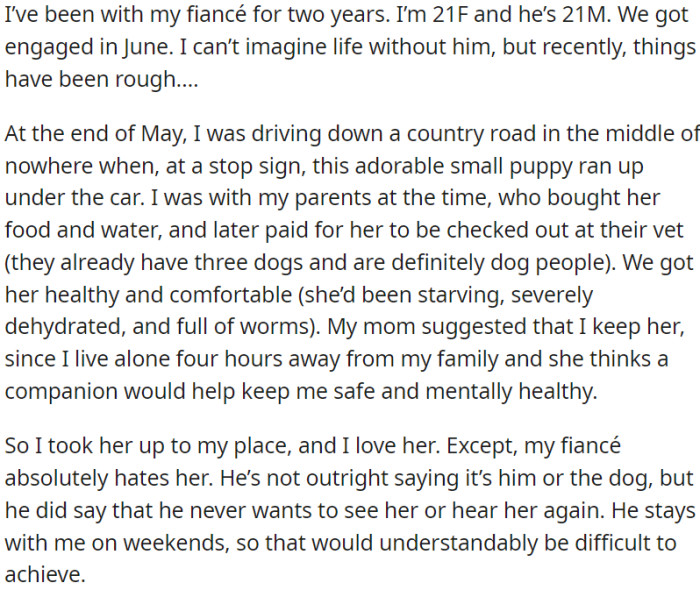
OP's fiancé has his own reasons why he can't stand the puppy.
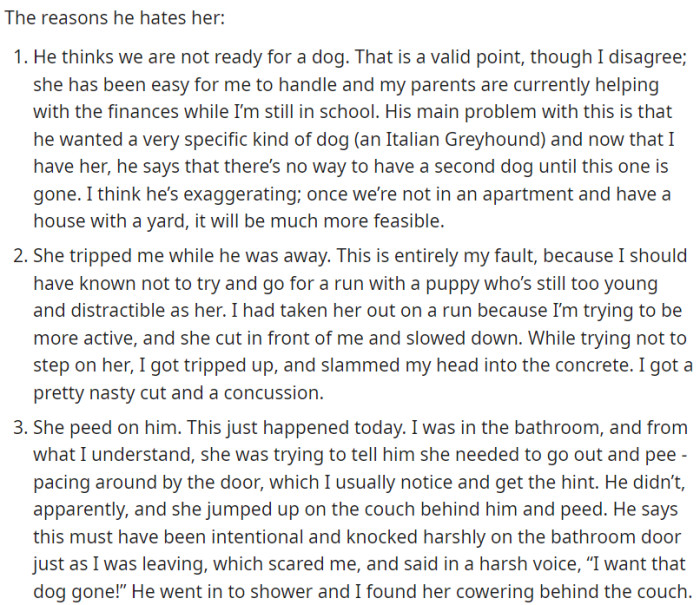
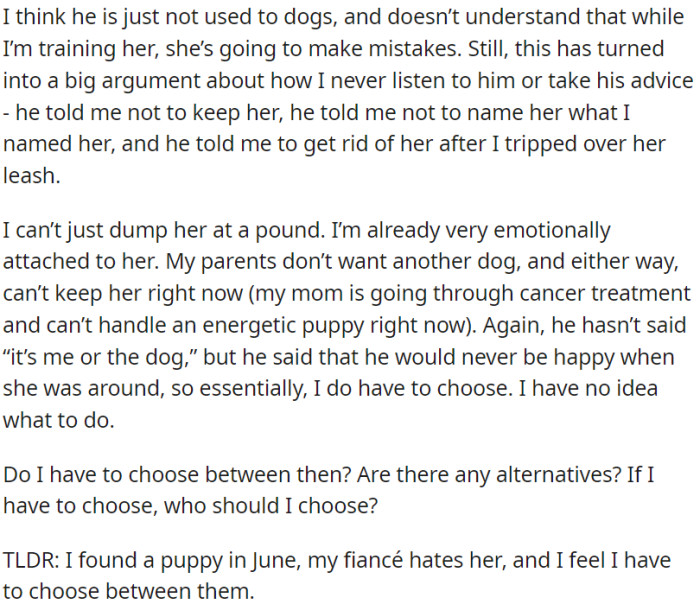
Understanding Attachment Styles
Dr. Mary Ainsworth's research on attachment theory reveals that early relationships significantly shape how individuals interact in adult relationships.
When faced with conflicting loyalties, such as between a beloved pet and a partner, individuals may experience anxiety stemming from insecure attachment styles.
This conflict can exacerbate feelings of abandonment or rejection, especially if the partner's dislike triggers past experiences of being caught between love and loss.
The Dynamics of Competing Attachments
In situations where a partner and a pet compete for attention, the underlying dynamics often reflect attachment theory principles. According to Dr. John Bowlby, the founder of attachment theory, our emotional bonds with significant beings—be they human or animal—shape our relational behaviors. The young woman's dilemma illustrates how these attachments can create tension, particularly when one party feels threatened or unvalued.
Research indicates that individuals often project their emotional needs onto pets, which can intensify feelings of jealousy or resentment in romantic relationships. The challenge lies in balancing these attachments while fostering understanding and empathy for each other's needs.
OP's fiancé is overreacting to minor puppy misbehavior.
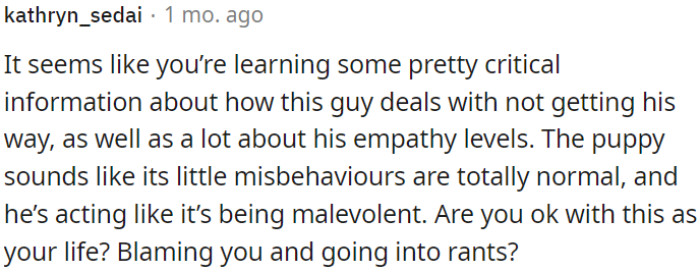
A true partner is supportive, unlike someone acting like a tantrum-throwing child.
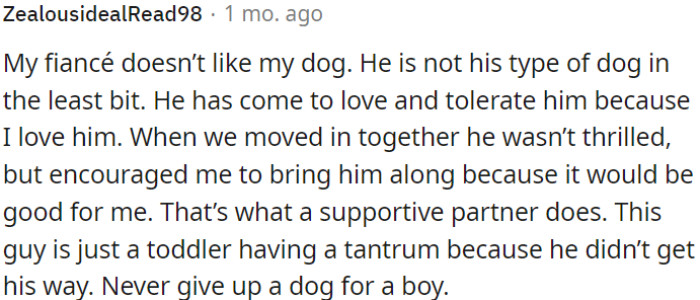
OP should prioritize the dog over the fiancé due to his aggressive reaction to a simple puppy mistake.
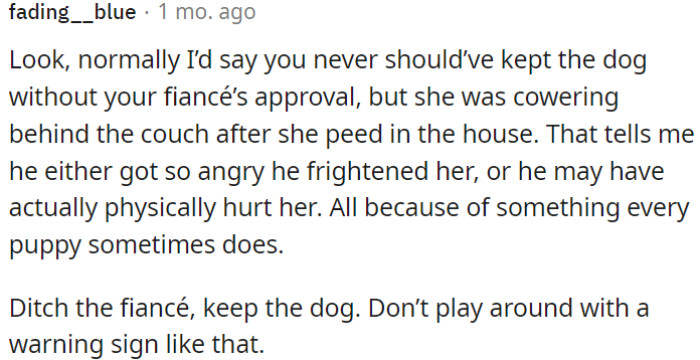
Research from the Journal of Personality and Social Psychology indicates that our relationships with pets often mimic those we have with humans.
Pets can fulfill emotional needs for companionship and unconditional love, making decisions that involve them particularly fraught for individuals who rely on them for emotional support.
Understanding this dynamic can help individuals navigate complex feelings when facing relationship challenges.
From a behavioral perspective, this scenario can be viewed through the lens of conflict resolution strategies. Studies from the Journal of Conflict Resolution highlight that recognizing the underlying needs of both parties can lead to healthier outcomes. In this case, open communication about feelings toward the dog and the fiancé's concerns is essential.
Therapists recommend using 'I' statements to express emotions and needs, which can help prevent defensive reactions and promote constructive dialogue. For instance, saying 'I feel anxious when you express dislike for my dog' rather than using accusatory statements can shift the conversation toward understanding.
The dog is a loyal companion, while the fiancé hasn't proven deserving of a place in OP's life.
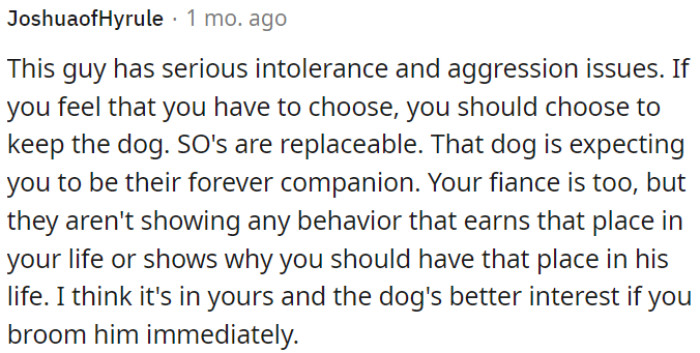
It would be more beneficial if OP decided to keep the dog.

If OP's fiancé struggles to handle the dog during weekend visits, yet insists on an expensive, high-maintenance breed, it could be a red flag.
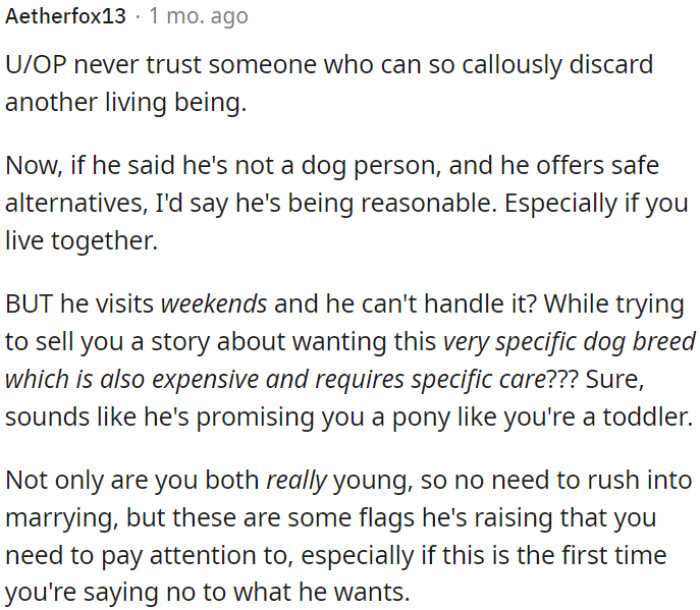
Practical Solutions for Navigating Conflict
Experts recommend open communication as a crucial step when navigating conflicts related to pets and partners.
Establishing boundaries that respect both the partner's feelings and the pet's importance can foster a healthier dialogue.
Couples therapy can also be beneficial in these situations, helping partners understand each other's perspectives and needs.
Compassionate Communication Strategies
Effective communication is vital in resolving conflicts involving loved ones. Research indicates that empathy plays a crucial role in understanding and addressing relational tensions. When partners practice active listening, they create a safe environment for expressing vulnerabilities, which can mitigate feelings of resentment.
Studies demonstrate that couples who engage in empathetic communication show higher relationship satisfaction. Incorporating techniques such as reflective listening, where one partner paraphrases the other's feelings before responding, can foster deeper emotional connections and reduce misunderstandings.
OP's fiancé isn't good; she should leave him.
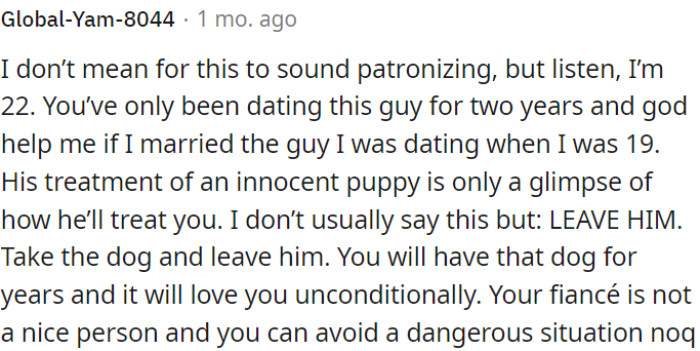
OP's fiancé needs to prioritize her happiness over his own wishes.
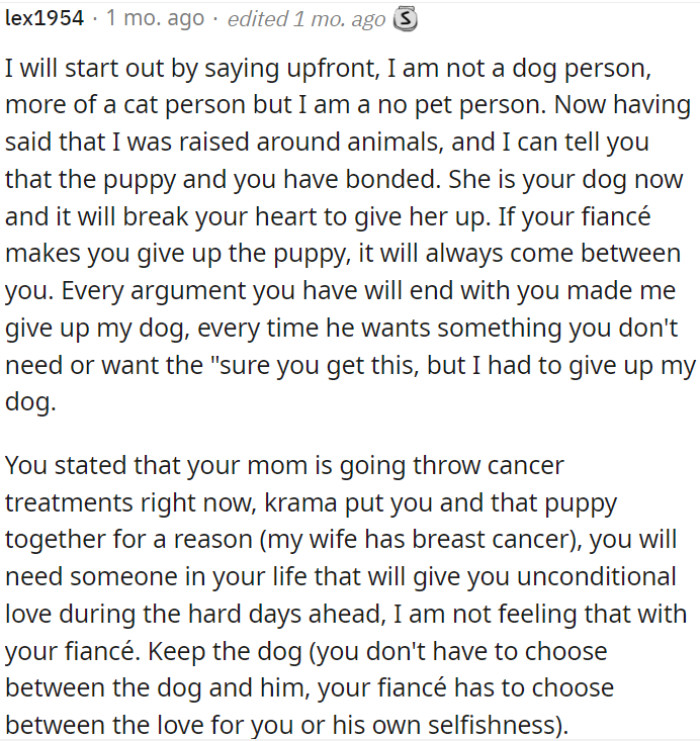
OP has to consider this as a warning to end the relationship.
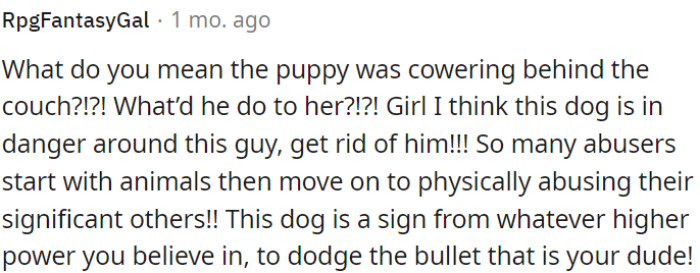
Behavioral psychologists note that cognitive dissonance often arises in situations where values conflict, such as prioritizing a pet over a partner.
This internal struggle can lead to stress and anxiety, ultimately affecting overall relationship satisfaction.
Addressing these feelings through reflective exercises can help individuals align their actions with their values, reducing internal conflict.
Additionally, exploring the emotional history behind the fiancé's aversion to the dog can provide valuable insights. Behavioral psychologists suggest that unresolved issues from past experiences—such as childhood trauma involving pets—can manifest in adult relationships. Understanding these triggers can facilitate healing and promote compassionate responses.
Encouraging both parties to reflect on their emotional histories and how these experiences shape their interactions can pave the way for greater empathy and connection in the relationship.
Although the main issue seems to be about a pet, there's more going on underneath – it's about how she and her fiancé get along.
The way her fiancé deals with this challenge can reveal a lot about how he acts and behaves. This moment can make her think about whether his current reaction to a small problem could indicate how he'll handle bigger problems later on.
When feelings are strong and tensions rise, people often show their true selves. If he reacts with anger or aggression over something involving a pet, it raises questions about how he would deal with bigger problems that naturally arise in relationships.
Would he act the same way? This situation can prompt her to consider whether they truly agree on important matters and if they communicate well. It's a lesson worth paying attention to.
Navigating Emotional Needs
When faced with such dilemmas, it’s crucial to recognize that emotional needs are not mutually exclusive. Research in social psychology emphasizes that individuals can learn to appreciate the emotional significance pets hold for their partners while also expressing their concerns.
Practicing flexibility and exploring alternative solutions—such as including the dog in activities together—can help bridge the gap between differing emotional needs. Couples therapy can also be a proactive approach, providing a structured environment to address these issues with professional guidance.
Psychological Analysis
This situation reflects a common challenge in relationships where emotional attachments to pets can conflict with partner dynamics. It's essential to recognize that both parties have valid feelings that stem from their past experiences and emotional needs. Addressing these concerns through open dialogue can promote mutual understanding and strengthen the relationship.
Analysis generated by AI
Analysis & Alternative Approaches
The exploration of attachment dynamics in this scenario highlights the complexity of emotional relationships. As Dr. Esther Perel, a renowned couples therapist, states, "The quality of our relationships determines the quality of our lives." Understanding the root causes of conflict often leads to healthier resolutions. Ultimately, fostering open communication and empathy can create a more harmonious relationship environment, as emphasized by Dr. John Gottman, who notes, "The secret to a happy marriage is not in avoiding conflict, but in how we manage it."
The Role of Empathy in Relationships
Empathy plays a critical role in resolving conflicts in relationships, especially when it comes to differing opinions about pets.
Research from emotional intelligence studies shows that understanding a partner's emotional needs can lead to more harmonious relationships.
Engaging in active listening and validating each other's feelings can significantly mitigate tensions and foster deeper connections.
Psychological Analysis
This situation illustrates a common psychological conflict where one partner feels threatened by the emotional bond another has with a pet.
Understanding the roots of these feelings can help couples find common ground and navigate their differing values more effectively.
Analysis generated by AI
Analysis & Alternative Approaches
Mental health professionals emphasize that conflicts involving pets often reflect deeper emotional needs and relationship dynamics.
Recognizing the importance of both partners' perspectives can facilitate healthier discussions and resolutions.
Ultimately, fostering empathy and understanding is key to navigating these complex emotional landscapes.



